Kathleen Jones's Blog, page 13
May 15, 2017
Tuesday Poem: All the People in Hopper's Paintings by B.H. Fairchild
All the people in Hopper's paintings walk by me
here in the twilight the way our neighbors
would stroll by of an evening in my hometown
smiling and waving as I leaned against
the front-porch railing and hated them all
and the place I had grown up in. I smoked
my Pall Mall with a beautifully controlled rage
in the manner of James Dean and imagined
life beyond the plains in the towns of Hopper
where people were touched by the light of the real.
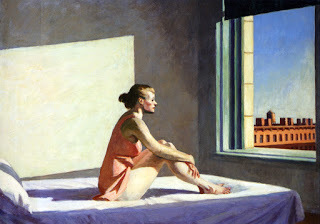
The people in Hopper's paintings were lonely
as I was and lived in brown rooms whose
long, sad windows looked out on the roofs
of brown buildings in the towns that made
them lonely. Or they lived in coffee shops
and cafes at 3 a.m under decadent flowers
of cigarette smoke as I thought I would have
if there had been such late-night conspiracy
in the town that held me but offered nothing.
And now they gather around with their bland,
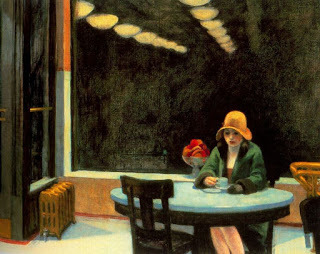
mysterious faces in half-shadow, many still
bearing the hard plane of light that found them
from the left side of the room, as in Vermeer,
others wearing the dark splotches of early
evening across their foreheads and chins that said
they were, like me, tragic, dark, undiscovered:
.................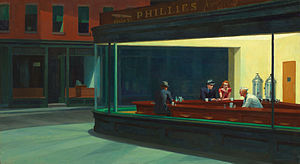
. . . . . Why was their monotony blessed, their melancholy apocalyptic, while my days hung like red rags from my pockets
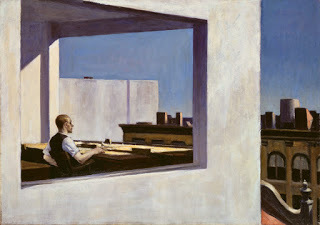
as I stood, welding torch in hand, and searched the horizon with the eyes and straight mouth of Hopper's women? If they had come walking toward me, those angels of boredom, if they had arrived clothed in their robes of light, would I have recognized them? If all those women staring out of windows had risen from their desks and unmade beds, and the men from their offices and sun-draped brownstones, would I have known? Would I have felt their light hands touching
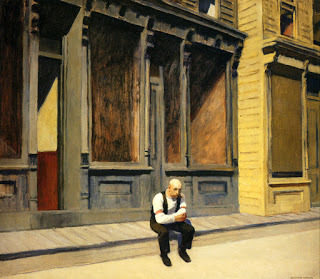
my face the way infants do when peopleseem no more real than dreams or picture books?The girl in the blue gown leaning from her doorat high noon, the gray-haired gentlemanin the hotel by the railroad, holding his cigaretteso delicately, they have found me, and wewalk slowly through the small Kansas townthat held me and offered nothing, where the lightfell through the windows of brown rooms, and peoplelooked out, strangely, as if they had been painted there.
© B.H. Fairchild, The Blue Buick, Norton NY, 2014
There's a quality in the work of Edward Hopper that's instantly recognisable - the lonely, isolated people who appear the same even in social situations - the lonely isolated places, like the iconic gas station in an abandoned wayside halt. Isolation in the middle of civilisation. And that's one of the qualities of B H Fairchild's poetry too. Some of my favourite poems are those that deal with the dust bowl tragedy on the prairies of America. The Beauty of Abandoned Towns has 'Bindweed and crabgrass shouldering through asphalt cracks, rats scuttling down drainpipes, undergrowth seething with grasshoppers.' while sunflowers bang 'their heads on a conclusion of brick, the wind's last argument lost in a yellow cloud,' and broken windows flash 'the setting sun in a little apocalypse of light'. These later poems are quite political in their condemnation of an agricultural policy that ploughed up 'ancient plains of short grass that fed bison', to plant commercial crops that turned the prairies into dust 'I look back/to see the sky turn sick with darkness,/ a deep brown-green bile boiling up to smear/the sun dull as rusted-out tin siding'. [Dust Storm, No Man's Land, 1952]
Commerce, the poems seem to say, doesn't make us happy. Ordinary people's lives changed with the creation of 'the lords of grain'. At first: 'The bumper crop in 1929. I stood on the front porch, dawn rolling over me like a river baptism because I was a new man in a new world, a stand of gold and green stretching from my hands to the sun coming up.' But later the vision from the front porch was more sinister: 'I still tense up when an afternoon sky darkens. A roller would come in, dust up to eight thousand feet. If you were in the field, you were lost until it cleared. Or dead from suffocation.'
I've only recently discovered B H Fairchild (why is American poetry so little known in the UK?) and I'm knocked out by his poetry. The stories that are told in these poems - the way lives are illuminated, just as the light falls in a Hopper painting, revealing only just enough, but creating an air of mystery. One of his early poems is typical of both content and style - called 'In a Cafe near Tuba City, Arizona, Beating My Head against a Cigarette Machine' (which is a poem in itself!) It begins; 'The ruptured Pontiac, comatose and tilted on three wheels,/ seems to sink slowly like a drunken ship into the asphalt' and continues into an analysis of relationships, past and present, apocalyptic events and the incoveniences of being broke. A minor incident, the breakdown of a car, becomes a major poem. Fairchild's work comes from the lost heart of America, Trumpville, where hopelessness and despair motivated a massive vote against the establishment. If you want to understand that, read BH Fairchild's poetry.
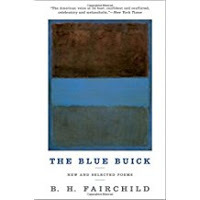
The Blue Buick, New and Selected Poems, published by Norton NY, 2014
here in the twilight the way our neighbors
would stroll by of an evening in my hometown
smiling and waving as I leaned against
the front-porch railing and hated them all
and the place I had grown up in. I smoked
my Pall Mall with a beautifully controlled rage
in the manner of James Dean and imagined
life beyond the plains in the towns of Hopper
where people were touched by the light of the real.

The people in Hopper's paintings were lonely
as I was and lived in brown rooms whose
long, sad windows looked out on the roofs
of brown buildings in the towns that made
them lonely. Or they lived in coffee shops
and cafes at 3 a.m under decadent flowers
of cigarette smoke as I thought I would have
if there had been such late-night conspiracy
in the town that held me but offered nothing.
And now they gather around with their bland,

mysterious faces in half-shadow, many still
bearing the hard plane of light that found them
from the left side of the room, as in Vermeer,
others wearing the dark splotches of early
evening across their foreheads and chins that said
they were, like me, tragic, dark, undiscovered:
.................

. . . . . Why was their monotony blessed, their melancholy apocalyptic, while my days hung like red rags from my pockets

as I stood, welding torch in hand, and searched the horizon with the eyes and straight mouth of Hopper's women? If they had come walking toward me, those angels of boredom, if they had arrived clothed in their robes of light, would I have recognized them? If all those women staring out of windows had risen from their desks and unmade beds, and the men from their offices and sun-draped brownstones, would I have known? Would I have felt their light hands touching

my face the way infants do when peopleseem no more real than dreams or picture books?The girl in the blue gown leaning from her doorat high noon, the gray-haired gentlemanin the hotel by the railroad, holding his cigaretteso delicately, they have found me, and wewalk slowly through the small Kansas townthat held me and offered nothing, where the lightfell through the windows of brown rooms, and peoplelooked out, strangely, as if they had been painted there.
© B.H. Fairchild, The Blue Buick, Norton NY, 2014
There's a quality in the work of Edward Hopper that's instantly recognisable - the lonely, isolated people who appear the same even in social situations - the lonely isolated places, like the iconic gas station in an abandoned wayside halt. Isolation in the middle of civilisation. And that's one of the qualities of B H Fairchild's poetry too. Some of my favourite poems are those that deal with the dust bowl tragedy on the prairies of America. The Beauty of Abandoned Towns has 'Bindweed and crabgrass shouldering through asphalt cracks, rats scuttling down drainpipes, undergrowth seething with grasshoppers.' while sunflowers bang 'their heads on a conclusion of brick, the wind's last argument lost in a yellow cloud,' and broken windows flash 'the setting sun in a little apocalypse of light'. These later poems are quite political in their condemnation of an agricultural policy that ploughed up 'ancient plains of short grass that fed bison', to plant commercial crops that turned the prairies into dust 'I look back/to see the sky turn sick with darkness,/ a deep brown-green bile boiling up to smear/the sun dull as rusted-out tin siding'. [Dust Storm, No Man's Land, 1952]
Commerce, the poems seem to say, doesn't make us happy. Ordinary people's lives changed with the creation of 'the lords of grain'. At first: 'The bumper crop in 1929. I stood on the front porch, dawn rolling over me like a river baptism because I was a new man in a new world, a stand of gold and green stretching from my hands to the sun coming up.' But later the vision from the front porch was more sinister: 'I still tense up when an afternoon sky darkens. A roller would come in, dust up to eight thousand feet. If you were in the field, you were lost until it cleared. Or dead from suffocation.'
I've only recently discovered B H Fairchild (why is American poetry so little known in the UK?) and I'm knocked out by his poetry. The stories that are told in these poems - the way lives are illuminated, just as the light falls in a Hopper painting, revealing only just enough, but creating an air of mystery. One of his early poems is typical of both content and style - called 'In a Cafe near Tuba City, Arizona, Beating My Head against a Cigarette Machine' (which is a poem in itself!) It begins; 'The ruptured Pontiac, comatose and tilted on three wheels,/ seems to sink slowly like a drunken ship into the asphalt' and continues into an analysis of relationships, past and present, apocalyptic events and the incoveniences of being broke. A minor incident, the breakdown of a car, becomes a major poem. Fairchild's work comes from the lost heart of America, Trumpville, where hopelessness and despair motivated a massive vote against the establishment. If you want to understand that, read BH Fairchild's poetry.

The Blue Buick, New and Selected Poems, published by Norton NY, 2014
Published on May 15, 2017 16:30
May 14, 2017
The scent of Lilac and Katherine Mansfield
The lilac tree in my garden is suddenly blooming - up here in the north spring comes late with frequent frosts, even in May. But lilac is very resilient - it grows with the determination of a weed. There's hardly a farm or cottage in the Lake District that doesn't have its lilac bush at the gate.
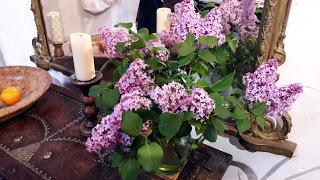 My lilac in a jug Lilac has a strong scent - you either love it or hate it. I love it because it means spring has really arrived. And it has other associations too. First, it reminds me of Katherine Mansfield. She also loved lilac, but it represented a tragic and (for her) deeply shameful period of her life. Katherine, only a teenager at the time, was pregnant with her lover's child. It was 1909 and having a baby out of wedlock was one of the worst crimes a nicely brought up girl could commit.
My lilac in a jug Lilac has a strong scent - you either love it or hate it. I love it because it means spring has really arrived. And it has other associations too. First, it reminds me of Katherine Mansfield. She also loved lilac, but it represented a tragic and (for her) deeply shameful period of her life. Katherine, only a teenager at the time, was pregnant with her lover's child. It was 1909 and having a baby out of wedlock was one of the worst crimes a nicely brought up girl could commit.
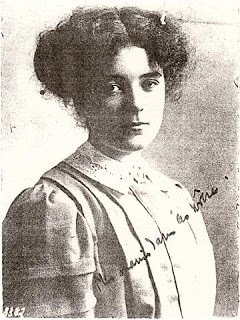 Katherine when she was in love with Garnet TrowellKatherine was on her own in London, trying to pursue a career as a writer. Becoming pregnant threw her into panic. She married her singing teacher, a man she didn't love, and left him on their wedding night because she couldn't bear to share a bed with him. Her mother arrived from New Zealand and immediately bundled Katherine onto a train for Bad Worishofen - a small spa in Germany where inconvenient health problems could be dealt with out of the public eye.
Katherine when she was in love with Garnet TrowellKatherine was on her own in London, trying to pursue a career as a writer. Becoming pregnant threw her into panic. She married her singing teacher, a man she didn't love, and left him on their wedding night because she couldn't bear to share a bed with him. Her mother arrived from New Zealand and immediately bundled Katherine onto a train for Bad Worishofen - a small spa in Germany where inconvenient health problems could be dealt with out of the public eye.
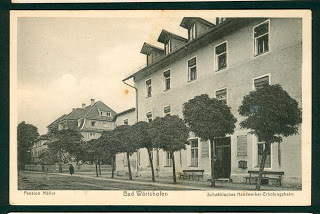 The Pension Muller, where her baby was stillborn.Katherine's lover, the 19 year old Garnet Trowell, had been separated from her by his family. Grieving, distraught, she wrote him a despairing letter from the train. 'Dearest, there is so much to tell you of . . .' It would never be posted. Everywhere on the journey there was lilac growing in back gardens. 'At the German frontier where all the baggage was examined . . I went out of the station and ran down a little path and looked over a fence. Lilac filled the air - it seemed almost smudged with lilac, washed in it .' For the rest of her life lilac had a special significance - its colour 'like half-mourning', and its perfume which was tainted by the loss of her lover and the death of the child she was carrying, stillborn after a premature labour. It was an experience she was never able to talk about, even to the man she eventually married.
The Pension Muller, where her baby was stillborn.Katherine's lover, the 19 year old Garnet Trowell, had been separated from her by his family. Grieving, distraught, she wrote him a despairing letter from the train. 'Dearest, there is so much to tell you of . . .' It would never be posted. Everywhere on the journey there was lilac growing in back gardens. 'At the German frontier where all the baggage was examined . . I went out of the station and ran down a little path and looked over a fence. Lilac filled the air - it seemed almost smudged with lilac, washed in it .' For the rest of her life lilac had a special significance - its colour 'like half-mourning', and its perfume which was tainted by the loss of her lover and the death of the child she was carrying, stillborn after a premature labour. It was an experience she was never able to talk about, even to the man she eventually married.
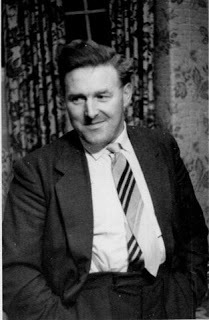 My lilac loving father.For me, lilac is all about my father. It was one of his favourite plants, and when he died my uncle bought me a lilac bush to plant in the garden to remember him by. So, now I remember two people - my father and my uncle, both dead, when the lilac comes into bloom.
My lilac loving father.For me, lilac is all about my father. It was one of his favourite plants, and when he died my uncle bought me a lilac bush to plant in the garden to remember him by. So, now I remember two people - my father and my uncle, both dead, when the lilac comes into bloom.
It's been a dry winter here and a very dry spring. We have had long days in April and May with sun and cool easterly winds. The garden is parched and the River Eden as low as I have ever seen it. The weir is high and dry, with only a thread of water going over it in the middle. The winter's driftwood is still piled up on the weir waiting for a decent flood to carry it downstream. But after the terrible floods of Storm Desmond in 1915 I'm quite happy to have a little drought. Apparently the wind is changing direction tomorrow to the more usual westerly breeze from the warmer Atlantic, so I guess that means rain! It will ruin the lilac, so I've picked as much of it as I can.
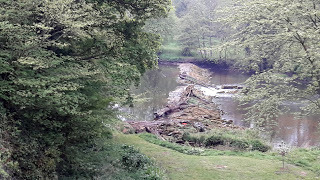 Low water at the Mill.
Low water at the Mill.
 My lilac in a jug Lilac has a strong scent - you either love it or hate it. I love it because it means spring has really arrived. And it has other associations too. First, it reminds me of Katherine Mansfield. She also loved lilac, but it represented a tragic and (for her) deeply shameful period of her life. Katherine, only a teenager at the time, was pregnant with her lover's child. It was 1909 and having a baby out of wedlock was one of the worst crimes a nicely brought up girl could commit.
My lilac in a jug Lilac has a strong scent - you either love it or hate it. I love it because it means spring has really arrived. And it has other associations too. First, it reminds me of Katherine Mansfield. She also loved lilac, but it represented a tragic and (for her) deeply shameful period of her life. Katherine, only a teenager at the time, was pregnant with her lover's child. It was 1909 and having a baby out of wedlock was one of the worst crimes a nicely brought up girl could commit.  Katherine when she was in love with Garnet TrowellKatherine was on her own in London, trying to pursue a career as a writer. Becoming pregnant threw her into panic. She married her singing teacher, a man she didn't love, and left him on their wedding night because she couldn't bear to share a bed with him. Her mother arrived from New Zealand and immediately bundled Katherine onto a train for Bad Worishofen - a small spa in Germany where inconvenient health problems could be dealt with out of the public eye.
Katherine when she was in love with Garnet TrowellKatherine was on her own in London, trying to pursue a career as a writer. Becoming pregnant threw her into panic. She married her singing teacher, a man she didn't love, and left him on their wedding night because she couldn't bear to share a bed with him. Her mother arrived from New Zealand and immediately bundled Katherine onto a train for Bad Worishofen - a small spa in Germany where inconvenient health problems could be dealt with out of the public eye. The Pension Muller, where her baby was stillborn.Katherine's lover, the 19 year old Garnet Trowell, had been separated from her by his family. Grieving, distraught, she wrote him a despairing letter from the train. 'Dearest, there is so much to tell you of . . .' It would never be posted. Everywhere on the journey there was lilac growing in back gardens. 'At the German frontier where all the baggage was examined . . I went out of the station and ran down a little path and looked over a fence. Lilac filled the air - it seemed almost smudged with lilac, washed in it .' For the rest of her life lilac had a special significance - its colour 'like half-mourning', and its perfume which was tainted by the loss of her lover and the death of the child she was carrying, stillborn after a premature labour. It was an experience she was never able to talk about, even to the man she eventually married.
The Pension Muller, where her baby was stillborn.Katherine's lover, the 19 year old Garnet Trowell, had been separated from her by his family. Grieving, distraught, she wrote him a despairing letter from the train. 'Dearest, there is so much to tell you of . . .' It would never be posted. Everywhere on the journey there was lilac growing in back gardens. 'At the German frontier where all the baggage was examined . . I went out of the station and ran down a little path and looked over a fence. Lilac filled the air - it seemed almost smudged with lilac, washed in it .' For the rest of her life lilac had a special significance - its colour 'like half-mourning', and its perfume which was tainted by the loss of her lover and the death of the child she was carrying, stillborn after a premature labour. It was an experience she was never able to talk about, even to the man she eventually married. My lilac loving father.For me, lilac is all about my father. It was one of his favourite plants, and when he died my uncle bought me a lilac bush to plant in the garden to remember him by. So, now I remember two people - my father and my uncle, both dead, when the lilac comes into bloom.
My lilac loving father.For me, lilac is all about my father. It was one of his favourite plants, and when he died my uncle bought me a lilac bush to plant in the garden to remember him by. So, now I remember two people - my father and my uncle, both dead, when the lilac comes into bloom.It's been a dry winter here and a very dry spring. We have had long days in April and May with sun and cool easterly winds. The garden is parched and the River Eden as low as I have ever seen it. The weir is high and dry, with only a thread of water going over it in the middle. The winter's driftwood is still piled up on the weir waiting for a decent flood to carry it downstream. But after the terrible floods of Storm Desmond in 1915 I'm quite happy to have a little drought. Apparently the wind is changing direction tomorrow to the more usual westerly breeze from the warmer Atlantic, so I guess that means rain! It will ruin the lilac, so I've picked as much of it as I can.
 Low water at the Mill.
Low water at the Mill.
Published on May 14, 2017 14:42
May 10, 2017
Tuesday Poem on Wednesday - Emma Press launches the Aunthology!
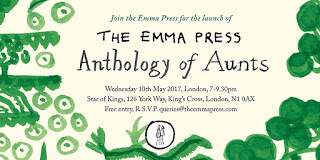
Today is the launch of Emma Press's latest anthology - the Anthology of Aunts (apparently Aunthology was one of the titles facetiously suggested!) It's being launched at a poetry party at the Star of Kings, Kings Cross, from 7pm to 9pm. I was supposed to be one of the readers, but have been forced to drop out for personal reasons. Which is a pity - it's going to be a fantastic event. I've only had a glimpse, through the Emma Press blog , of the contents of the anthology but they seem as varied and fascinating as you'd expect from this innovative poetry press. Some of the poets have been writing prose pieces on the blog, with photographs, about the aunts they either loved or hated, or sometimes about the experience of just being an aunt. My contribution is about my Aunt Hilda, who was really a great aunt in a big extended family where the 'greats' were sometimes younger than my parents.
Broken Biscuits
Aunt Hilda was a packer at the biscuit works,
sorting the custard creams and plain digestives,
bringing us bags of crumbed fragments
that tasted of each other, dipped in a hot brew.
The teapot was glazed with tannin inside
and out, its bitter tang offset with reject pink-
iced fancies. When Hilda cuddled me, I wriggled
free from the tight press of her arms and the need
I sensed at five or six but couldn’t name. I told
my mother that I loathed the odour of vanilla.
Hilda was late-married to my uncle Fred, a nervy
mother’s boy marched to the church door – we were
told – by brothers of the bride he never made
a wife. She wept daily at her sister’s kitchen table;
broke open on the bus to Blackpool screaming
that God would make her pregnant with the child
she longed for. Sectioned to the Bedlam
we were all afraid of, bare rooms that stank of urine
and singed hair, Hilda, shocked into sanity but altered,
walked with us in the garden, quiet with blank eyes.
Fred was obsessed with cleanliness, feared
germs, contamination; wouldn’t shake your hand.
And when he sickened like a child she fed him
with a spoon, nursed him, washed his clothes,
winding him into the sheet she hoped
would be his last. She found release among
the company of women on the packing line,
fattened on that sweet diet, smelling of chocolate
and vanilla, consuming the crumbs, never the whole thing.
Copyright, Kathleen Jones, 2017
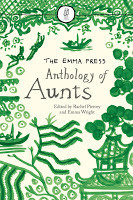
From The Anthology of Aunts, Emma Press, 2017
If you'd like to buy a copy you can get one from Emma Press on the link above, or purchase from Amazon.
Published on May 10, 2017 03:22
May 2, 2017
Tuesday Poem: Featherweight by Angela Readman
The farrier hands me a stone like an egg, clefted,
heart-shaped enough. I pocket it, laden with love.
On the way home, I rush past a hush of reeds and
picture a walk down the aisle. We’ll marry on a
Monday when the church costs less. I will wear a
plain shift, loaded with only one shade of white,
watermarks ironed off my back.
Outside the woodshed, Mother bites the webs
of her hands to black scabs. I nod. We speak only
hisses. Our eyes are varnish, keep what we don't
say intact. She knew it was coming. I'm old enough.
Eventually I was going to be loved. She lights the
swan skin. It burns like a sigh.The air plucks smoky
strands, wisps dust a chalked moon.
The skin felt too big, hand-me-down feathers too
heavy for flight. Then, it fit like a blizzard, down
between my legs tickled my petticoat to shreds,
swept my skinny legs up. It was the same for
her, I suppose - all this flying and loving and not
knowing how to stop. The steel of our wings can
break first love's back - we do not know our span.
Boys who got too close snapped, spines skinny
rushes whistling in the wind.
The skin spits. Mother pokes ash, her neck is a coat
hook hanging up the moonlight.
I, too, will marry a man who never saw me as a swan.
He will not know as birds we miss nothing. Yet when
he kisses me, softly, woman, I miss my beak.
Copyright Angela Readman, 2016
from The Book of Tides, Nine Arches Press , 2016
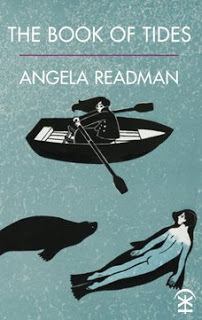
When William Carlos Williams was writing about poetry in 1939 ('The Poet and His Poems' -note the male pronoun!), he came to this conclusion:-
It should
be a song - made of
particulars, wasps,
a gentian - something
immediate, open
scissors, a lady's
eyes - the particulars
of a song waking
upon a bed of sound.
The poems in this collection are definitely very strong on particulars and they also rest on a bed of song, lyrical and rhythmic. The language is as jagged and demanding as the north east coast, where the rocky shoreline meets one of the most dangerous northern seas, notorious for its tidal rips and sudden storms. I heard a poet say recently that the kind of poetry they most detested was the 'polite, English variety'. Angela Readman doesn't do polite poetry. Her lines don't wander elegantly across the page (thank god!).They never take you where you expect and they throw up the unexpected word or image like glittering pebbles, or pieces of sea-glass.
Readman's poetry makes you work for it - but the close attention it deserves is worth every second. These poems are crammed with allusions and references and there's a constant undertow of myth and folktale.
Angela Readman was born in Middlesborough and lives in the North East and this is reflected in the language she uses - the odd 'Geordie' rhythm and dialect word. There are some wonderful words. One of the most accessible poems in the book is Rose Petal Jelly - deceptively simple. It begins . .
The apples drip slow as September
dabbing sun to the rain, juice
slips over the glazed lip of a jug.
Outside, a resilience of roses hold
in the wind. we feel petals open, jagged
caruncles in the corner of our eyes.
Caruncles are apparently the small red bumps at the inner corners of our eyes. I love poetry where the poet is obviously having a fiesta with language. I like poetry that brings me particulars, wasps, gentians, a lady's eye, roses, apple jelly and then goes on to show me more.
In the poem above, Featherweight, Readman is referencing the old myths about women who are also swans, or geese, but who will relinquish their magical heritage of shape-shifting to marry a human man who knows nothing of their double life. But the poem is more than that - it's about the cost of marriage for women, that egg-shaped stone, laden with love, that comes with a big price. I was a seventies feminist, so don't tell me that women can have it all - fabulous careers, wonderful relationships, perfect homes, perfect children, a creative life. You can't. You have to choose whether to have the cake or not. Never mind the eating of it. In the Confessions of a Selkie Readman goes back to the same subject:
You can spot a woman who once had a different skin.
Our eyes are mourning lockets set into rockface. . .
The lives we could have lived are charcoal . . .
But these are also poems about female power, as the mother in the title poem -
Like that, the old lass could switch into a ship's mast,
stood on that cliff, air wringing a swell of hips
out of her skirt. Then she was Ma again . . .
Flick,
flick, at licked pages in her big Book of Tides,
I watched her spit and tie the sky up, a snap
of fringe knotted into a handkerchief slipped
into a breast pocket.
The ideal poem, for me, is one that you can engage with on first reading, but that has a landscape behind it if you're willing to explore. I'm really enjoying this collection, reading and re-reading and wandering about in a salt-stained landscape. I shared one of the poems with my Friday reading group and they too loved it, finding layers and layers of meaning when they dived in. It's what makes Angela Readman an award-winning writer of both prose and poetry. One of my favourites in this collection is 'When We Don't Talk About the Weather' which begins:
The moon washes up to the window as you undress.
Outside, fishermen haul out the stars in their nets.
The sheets are an albatross, flapping over us. . . .
and goes on:
You lap me up like a drunk, open-mouthed for rain.
And I keen, the knot of me untied, absent loves
unmoored into storms without the anchor of a thought.
I'm happy to be carried out to sea on lines such as this!
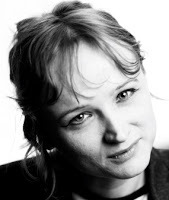 The Book of Tides is
published by Nine Arches Press
. Angela Readman won the International Rubery Book Award in 2015 for her book of short stories, 'Don't Try This at Home'. Her story 'The Keeper of the Jackalopes' won the Costa Short Story Award (2013) and her story 'Don't Try This At Home' was shortlisted for the same competition the previous year. In 2013, Readman won first prize in the Mslexia Women's Poetry Competition, judged by Kathleen Jamie. She won the National Flash Fiction Contest, and the Essex Poetry Prize in 2012 and was placed second in the first Short Story Competition in 2011. She has won New Writing North awards, and won the Ragged Raven longer poems competition . In 2005 she won The Biscuit Poetry competition and publication of a collection Sex with Elvis.
The Book of Tides is
published by Nine Arches Press
. Angela Readman won the International Rubery Book Award in 2015 for her book of short stories, 'Don't Try This at Home'. Her story 'The Keeper of the Jackalopes' won the Costa Short Story Award (2013) and her story 'Don't Try This At Home' was shortlisted for the same competition the previous year. In 2013, Readman won first prize in the Mslexia Women's Poetry Competition, judged by Kathleen Jamie. She won the National Flash Fiction Contest, and the Essex Poetry Prize in 2012 and was placed second in the first Short Story Competition in 2011. She has won New Writing North awards, and won the Ragged Raven longer poems competition . In 2005 she won The Biscuit Poetry competition and publication of a collection Sex with Elvis.Also available on Amazon.
Published on May 02, 2017 05:27
April 30, 2017
Northern Powerhouse? - Northern Poorhouse! Reality in the North
Remember that great Tory initiative, the Northern Powerhouse, blazed abroad by George Osborne? Want to understand why so many people up here voted for Brexit? Just come and take a look. My local town,
Penrith
, is a prime example. It's a small market town of about 15,000 inhabitants with a long history. There are Viking graves in the churchyard and a very substantial sandstone castle opposite the railway station which was the Northern residence of the notorious Richard III. Bonnie Prince Charlie stayed in the George Hotel in November 1745 while marching south to face the Duke of Cumberland's army at Clifton (3 miles away) for the battle that would end the Jacobite Rebellion. The small department store at right angles to the hotel, Arnison's, was owned by Wordsworth's mother's family and the Wordsworth children spent a lot of time there after they were orphaned.
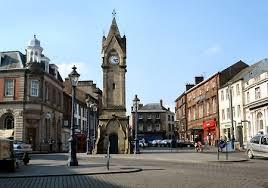 Market Square with Arnisons (top facing) and George Hotel on the right.The main sources of employment are tourism (we're 3 miles from the Lake District National Park), farming and service industries for the population. There used to be a big bakery, but that closed. Building and transport have also been big employers in the past but house-building has been in the doldrums since house prices rose beyond the reach of local people and the transport industry has been badly hit by cuts. Even so there's almost full employment around here and staff have to be recruited from elsewhere for the hotels and restaurants in the summer (usually eastern Europe). Cumbrian ambulance services were also short of 27 paramedics which had to be recruited from Poland. Our health services are challenged by the geography (big distances and fells and lakes to be navigated). You can wait for at least an hour for an ambulance around here - and that's for an urgent call-out. GPs are also in short supply (my practice has only part time doctors and a long waiting time for appointments) and there's only one hospital with a fully functioning A&E and that has been (until a few weeks ago) in special measures. Food banks are booming as the cost of accommodation eats up the low salaries of young families. You get the picture.
Market Square with Arnisons (top facing) and George Hotel on the right.The main sources of employment are tourism (we're 3 miles from the Lake District National Park), farming and service industries for the population. There used to be a big bakery, but that closed. Building and transport have also been big employers in the past but house-building has been in the doldrums since house prices rose beyond the reach of local people and the transport industry has been badly hit by cuts. Even so there's almost full employment around here and staff have to be recruited from elsewhere for the hotels and restaurants in the summer (usually eastern Europe). Cumbrian ambulance services were also short of 27 paramedics which had to be recruited from Poland. Our health services are challenged by the geography (big distances and fells and lakes to be navigated). You can wait for at least an hour for an ambulance around here - and that's for an urgent call-out. GPs are also in short supply (my practice has only part time doctors and a long waiting time for appointments) and there's only one hospital with a fully functioning A&E and that has been (until a few weeks ago) in special measures. Food banks are booming as the cost of accommodation eats up the low salaries of young families. You get the picture.
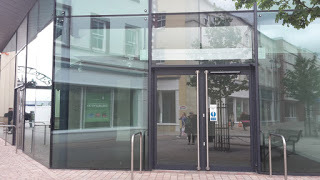 Empty arcade - A vision of the future?Before the financial crash there was a big 'Rural Regeneration' initiative, bolstered with European money. Their idea of rural regeneration was to create more shops. If this sounds absolutely bonkers, then it is! We have a reasonably static population with limited funds - wages are low around here. If you build shopping malls the same amount of spending money is going to be spread around these new outlets as well as the existing ones. The plans were put on hold when the financial crash of 2008 happened, but then revived as a sure fire solution to 'Rural Recovery'. Nothing anyone said in opposition did any good. So rows of little shops were bulldozed down and their proprietors put out of business. A large car park also vanished.
Empty arcade - A vision of the future?Before the financial crash there was a big 'Rural Regeneration' initiative, bolstered with European money. Their idea of rural regeneration was to create more shops. If this sounds absolutely bonkers, then it is! We have a reasonably static population with limited funds - wages are low around here. If you build shopping malls the same amount of spending money is going to be spread around these new outlets as well as the existing ones. The plans were put on hold when the financial crash of 2008 happened, but then revived as a sure fire solution to 'Rural Recovery'. Nothing anyone said in opposition did any good. So rows of little shops were bulldozed down and their proprietors put out of business. A large car park also vanished.
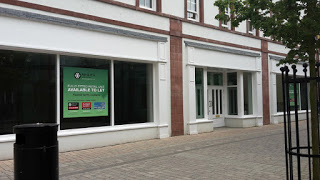 We've got streets of empty shopsA big shiny new shopping mall was created - Penrith New Squares - as well as two new supermarkets. We got a Booths (northern Waitrose) and a Sainsburys. Predictably two or our existing supermarkets went out of business as a result. One of them was a Coop department store which was very good value for money and could also cater for any household need you could think of. You now have to go to a big city to get things like that. Only Aldis is thriving here.
We've got streets of empty shopsA big shiny new shopping mall was created - Penrith New Squares - as well as two new supermarkets. We got a Booths (northern Waitrose) and a Sainsburys. Predictably two or our existing supermarkets went out of business as a result. One of them was a Coop department store which was very good value for money and could also cater for any household need you could think of. You now have to go to a big city to get things like that. Only Aldis is thriving here.
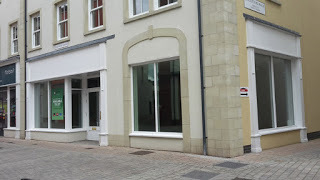 They're all 'To Let'That was 2011 - now, 6 years later the shopping mall still lies empty. It has an eerie feel to it as you walk through. Who is going to rent these shops? Certainly not the businesses that were bulldozed down - they can't afford to. And there aren't the customers to justify anything else. A couple of units have been occupied - Sports Direct has moved in, but seems to have a permanent sale. And we have a Boots opticians that is usually empty. There are empty shops and offices in the old town centre too. I mourn the money that has been spent, the small historic streets that were demolished, and the political ideology (which makes no economic sense) that shopping is somehow the answer to our contemporary ills. You can only spend your way out of a recession on huge amounts of borrowed money and look where that got us in 2008.
They're all 'To Let'That was 2011 - now, 6 years later the shopping mall still lies empty. It has an eerie feel to it as you walk through. Who is going to rent these shops? Certainly not the businesses that were bulldozed down - they can't afford to. And there aren't the customers to justify anything else. A couple of units have been occupied - Sports Direct has moved in, but seems to have a permanent sale. And we have a Boots opticians that is usually empty. There are empty shops and offices in the old town centre too. I mourn the money that has been spent, the small historic streets that were demolished, and the political ideology (which makes no economic sense) that shopping is somehow the answer to our contemporary ills. You can only spend your way out of a recession on huge amounts of borrowed money and look where that got us in 2008.
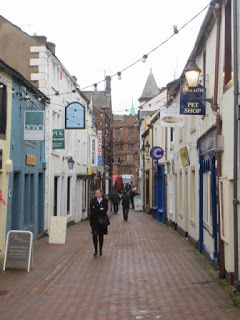 Angel Lane is still standing, but others were demolished to make way for New Squares.The north is not thriving - it's hanging on by its fingernails with low-paid, seasonal jobs and zero hours contracts. There's an increasing elderly population as people from the south sell their expensive real-estate and retire to cheaper houses in the north. Some areas are already referred to as 'God's Waiting Room'. The Brexit vote was intended by many (though not all) as a slap in the face to the government's increasingly south-facing policies (summed up by a recent cartoon 'Weather Warning: Snowfall affecting the unimportant 70% of the country may hit London') . In an area with a sitting Tory MP who has a huge, unassailable majority, there's little anyone can do to protest at the ballot box and that is democratically dangerous. What's the solution? I really don't know. Certainly some form of proportional representation (as in Scotland) and more autonomy for the North. Anyone got any good ideas that don't involve shopping?
Angel Lane is still standing, but others were demolished to make way for New Squares.The north is not thriving - it's hanging on by its fingernails with low-paid, seasonal jobs and zero hours contracts. There's an increasing elderly population as people from the south sell their expensive real-estate and retire to cheaper houses in the north. Some areas are already referred to as 'God's Waiting Room'. The Brexit vote was intended by many (though not all) as a slap in the face to the government's increasingly south-facing policies (summed up by a recent cartoon 'Weather Warning: Snowfall affecting the unimportant 70% of the country may hit London') . In an area with a sitting Tory MP who has a huge, unassailable majority, there's little anyone can do to protest at the ballot box and that is democratically dangerous. What's the solution? I really don't know. Certainly some form of proportional representation (as in Scotland) and more autonomy for the North. Anyone got any good ideas that don't involve shopping?
 Market Square with Arnisons (top facing) and George Hotel on the right.The main sources of employment are tourism (we're 3 miles from the Lake District National Park), farming and service industries for the population. There used to be a big bakery, but that closed. Building and transport have also been big employers in the past but house-building has been in the doldrums since house prices rose beyond the reach of local people and the transport industry has been badly hit by cuts. Even so there's almost full employment around here and staff have to be recruited from elsewhere for the hotels and restaurants in the summer (usually eastern Europe). Cumbrian ambulance services were also short of 27 paramedics which had to be recruited from Poland. Our health services are challenged by the geography (big distances and fells and lakes to be navigated). You can wait for at least an hour for an ambulance around here - and that's for an urgent call-out. GPs are also in short supply (my practice has only part time doctors and a long waiting time for appointments) and there's only one hospital with a fully functioning A&E and that has been (until a few weeks ago) in special measures. Food banks are booming as the cost of accommodation eats up the low salaries of young families. You get the picture.
Market Square with Arnisons (top facing) and George Hotel on the right.The main sources of employment are tourism (we're 3 miles from the Lake District National Park), farming and service industries for the population. There used to be a big bakery, but that closed. Building and transport have also been big employers in the past but house-building has been in the doldrums since house prices rose beyond the reach of local people and the transport industry has been badly hit by cuts. Even so there's almost full employment around here and staff have to be recruited from elsewhere for the hotels and restaurants in the summer (usually eastern Europe). Cumbrian ambulance services were also short of 27 paramedics which had to be recruited from Poland. Our health services are challenged by the geography (big distances and fells and lakes to be navigated). You can wait for at least an hour for an ambulance around here - and that's for an urgent call-out. GPs are also in short supply (my practice has only part time doctors and a long waiting time for appointments) and there's only one hospital with a fully functioning A&E and that has been (until a few weeks ago) in special measures. Food banks are booming as the cost of accommodation eats up the low salaries of young families. You get the picture. Empty arcade - A vision of the future?Before the financial crash there was a big 'Rural Regeneration' initiative, bolstered with European money. Their idea of rural regeneration was to create more shops. If this sounds absolutely bonkers, then it is! We have a reasonably static population with limited funds - wages are low around here. If you build shopping malls the same amount of spending money is going to be spread around these new outlets as well as the existing ones. The plans were put on hold when the financial crash of 2008 happened, but then revived as a sure fire solution to 'Rural Recovery'. Nothing anyone said in opposition did any good. So rows of little shops were bulldozed down and their proprietors put out of business. A large car park also vanished.
Empty arcade - A vision of the future?Before the financial crash there was a big 'Rural Regeneration' initiative, bolstered with European money. Their idea of rural regeneration was to create more shops. If this sounds absolutely bonkers, then it is! We have a reasonably static population with limited funds - wages are low around here. If you build shopping malls the same amount of spending money is going to be spread around these new outlets as well as the existing ones. The plans were put on hold when the financial crash of 2008 happened, but then revived as a sure fire solution to 'Rural Recovery'. Nothing anyone said in opposition did any good. So rows of little shops were bulldozed down and their proprietors put out of business. A large car park also vanished.  We've got streets of empty shopsA big shiny new shopping mall was created - Penrith New Squares - as well as two new supermarkets. We got a Booths (northern Waitrose) and a Sainsburys. Predictably two or our existing supermarkets went out of business as a result. One of them was a Coop department store which was very good value for money and could also cater for any household need you could think of. You now have to go to a big city to get things like that. Only Aldis is thriving here.
We've got streets of empty shopsA big shiny new shopping mall was created - Penrith New Squares - as well as two new supermarkets. We got a Booths (northern Waitrose) and a Sainsburys. Predictably two or our existing supermarkets went out of business as a result. One of them was a Coop department store which was very good value for money and could also cater for any household need you could think of. You now have to go to a big city to get things like that. Only Aldis is thriving here. They're all 'To Let'That was 2011 - now, 6 years later the shopping mall still lies empty. It has an eerie feel to it as you walk through. Who is going to rent these shops? Certainly not the businesses that were bulldozed down - they can't afford to. And there aren't the customers to justify anything else. A couple of units have been occupied - Sports Direct has moved in, but seems to have a permanent sale. And we have a Boots opticians that is usually empty. There are empty shops and offices in the old town centre too. I mourn the money that has been spent, the small historic streets that were demolished, and the political ideology (which makes no economic sense) that shopping is somehow the answer to our contemporary ills. You can only spend your way out of a recession on huge amounts of borrowed money and look where that got us in 2008.
They're all 'To Let'That was 2011 - now, 6 years later the shopping mall still lies empty. It has an eerie feel to it as you walk through. Who is going to rent these shops? Certainly not the businesses that were bulldozed down - they can't afford to. And there aren't the customers to justify anything else. A couple of units have been occupied - Sports Direct has moved in, but seems to have a permanent sale. And we have a Boots opticians that is usually empty. There are empty shops and offices in the old town centre too. I mourn the money that has been spent, the small historic streets that were demolished, and the political ideology (which makes no economic sense) that shopping is somehow the answer to our contemporary ills. You can only spend your way out of a recession on huge amounts of borrowed money and look where that got us in 2008. Angel Lane is still standing, but others were demolished to make way for New Squares.The north is not thriving - it's hanging on by its fingernails with low-paid, seasonal jobs and zero hours contracts. There's an increasing elderly population as people from the south sell their expensive real-estate and retire to cheaper houses in the north. Some areas are already referred to as 'God's Waiting Room'. The Brexit vote was intended by many (though not all) as a slap in the face to the government's increasingly south-facing policies (summed up by a recent cartoon 'Weather Warning: Snowfall affecting the unimportant 70% of the country may hit London') . In an area with a sitting Tory MP who has a huge, unassailable majority, there's little anyone can do to protest at the ballot box and that is democratically dangerous. What's the solution? I really don't know. Certainly some form of proportional representation (as in Scotland) and more autonomy for the North. Anyone got any good ideas that don't involve shopping?
Angel Lane is still standing, but others were demolished to make way for New Squares.The north is not thriving - it's hanging on by its fingernails with low-paid, seasonal jobs and zero hours contracts. There's an increasing elderly population as people from the south sell their expensive real-estate and retire to cheaper houses in the north. Some areas are already referred to as 'God's Waiting Room'. The Brexit vote was intended by many (though not all) as a slap in the face to the government's increasingly south-facing policies (summed up by a recent cartoon 'Weather Warning: Snowfall affecting the unimportant 70% of the country may hit London') . In an area with a sitting Tory MP who has a huge, unassailable majority, there's little anyone can do to protest at the ballot box and that is democratically dangerous. What's the solution? I really don't know. Certainly some form of proportional representation (as in Scotland) and more autonomy for the North. Anyone got any good ideas that don't involve shopping?
Published on April 30, 2017 06:20
April 24, 2017
Tuesday Poem: - Mapping Emily (and Wuthering Heights)
“I have to remind myself to breathe – almost to remind my heart to beat! . . . I wish I were a girl again, half-savage and hardy, and free.”
Emily Bronte - Wuthering Heights
1.
My lungs refuse to breathe.
I struggle; visualise the bronchi
as the diagram of an estuary, or a tree
branching out towards the open sky,
veined by the dark shadows of vessels
carrying the bright oxygen of the blood.
The intake and output of necessity.
2.
This is my heart, thudding like the wing-beats
of the red grouse that startled
from the bracken. The pulse of it against
the bone – a metronome beating time.
3.
My eyes are on the horizon, confused
by sky, the complications of path and rock,
pillows of gaudy sphagnum, the microscopic
yellow suns of Tormentil, bracken unravelling
like knitting, the burnt skeletons of heather and
the ruined steadings burying themselves
under turf and nettle. This is truth.
4.
This hand, knocking on the window;
the angular knuckles, fingers that can tear
meat and sinew from the bone, no gentleness,
but a strong grip on the pen, dipping its sharp nib
into the well, inking hard words in a small space,
needling the pages into a book, giving an identity
to this passion coffined in five feet six
by sixteen inches wide.
© Kathleen Jones 2017
From Mapping Emily, published by Templar Poetry, 2017
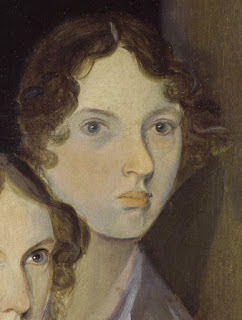 Emily Bronte painted by Branwell Bronte
Emily Bronte painted by Branwell BronteI wrote several of the poems for 'Mapping Emily' at Ponden Hall - the original house that Emily Bronte used for Wuthering Heights and Anne Bronte for Wildfell Hall. The two younger Bronte sisters spent a lot of time at Ponden, partly because it had a good library, but also because Branwell was friends with the son of the owners. Ponden Hall is where the Bronte sisters took refuge after the Crow Hill Bog Burst, an explosive landslide on the moor that terrified everyone in the vicinity.
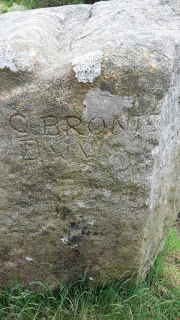 Charlotte's Stone
Charlotte's Stone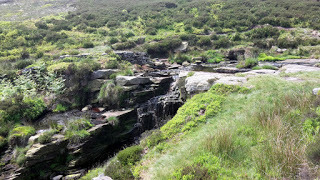 The waterfall they often walked to. Ponden is on the edge of the moors, a wild enough location not far from Haworth, and it's easy to walk the paths the Bronte sisters took to the waterfall, and to Top Withens, which is identified so often as Wuthering Heights the Bronte Society have erected a plaque categorically denying it. Ponden was named as Emily's inspiration by both Charlotte Bronte and her father. A (now withered) pear tree in the garden was apparently planted by a member of the Heaton family, its owners, to please Emily, who declined his advances.
The waterfall they often walked to. Ponden is on the edge of the moors, a wild enough location not far from Haworth, and it's easy to walk the paths the Bronte sisters took to the waterfall, and to Top Withens, which is identified so often as Wuthering Heights the Bronte Society have erected a plaque categorically denying it. Ponden was named as Emily's inspiration by both Charlotte Bronte and her father. A (now withered) pear tree in the garden was apparently planted by a member of the Heaton family, its owners, to please Emily, who declined his advances.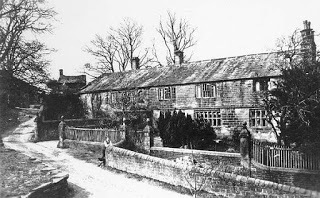 Ponden Hall as it was, and is now.
Ponden Hall as it was, and is now.
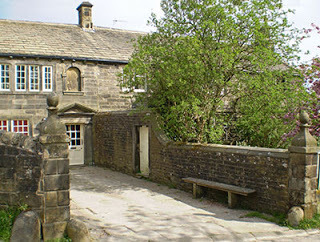
Many of the original features remain. Upstairs there's a box bed you can shut yourself into, with the small window that Cathy tapped on when she returned to haunt Heathcliff.
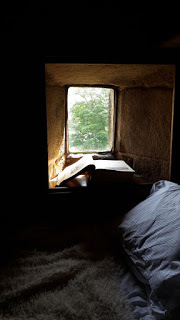
Staying there is a wonderful experience. I was lucky that Sally Wainwright's 'Walking Invisible' was being filmed while I was there and I was able to walk round the set they had built up on the moors, representing the Parsonage, the graveyard and the centre of Hawarth as it used to be in the Bronte's time.
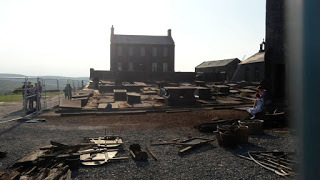
Rambling the paths that Emily walked daily was magical. I suffer from asthma and walking uphill is sometimes a struggle for my damaged lungs; but it also gave me an insight into the challenge that Emily faced, walking the moors with advanced turberculosis.
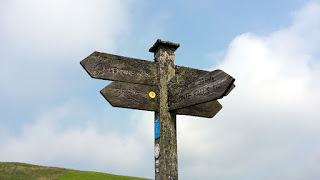
Emily was fearless, writing poems of passion and fury such as ' No Coward Soul is Mine ', and a novel that transgressed the Victorian moral code with incest, illegitimacy and extra marital love at its core. She was the most physical of the Bronte girls, kneading bread, chopping meat and bones, beating her dog with her bare fists until they bled. Yet those hands wrote some of the 'tiny books' you can see at Haworth parsonage museum, with minute print and delicate stitches to sew the small pages together. She was the tallest of the Brontes, but almost unbearably thin - her coffin was only sixteen inches wide.
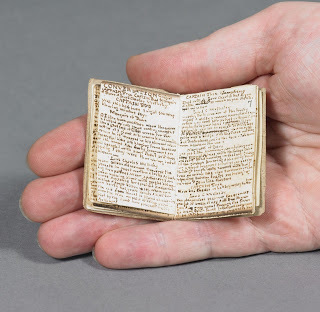
I'm launching 'Mapping Emily' at Keats' House in north London at a reading with Irish poet Olive Broderick, on Tuesday 25th April, at 7 pm. The event is free and there is wine!
You can buy the book from the publisher, Templar Poetry, on this link and eventually on Amazon.
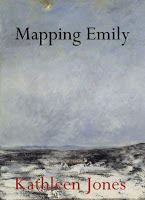
Published on April 24, 2017 15:30
April 23, 2017
The Concept of Leadership - and the mess it's got us into
Another round of elections, none of which seem to make life any better, and I can hear that word being bandied around on every TV or radio channel and it leaps out at me from every newspaper article on the stand. Leadership. That's what it's all about isn't it? That's the most essential quality to look for in the top job. The reason we should be going for anyone except Jeremy Corbyn. Right?
 Corbyn - an honest man?It seems it's not enough to have integrity and a set of rational, humane and economically sound policies. You also have to have this elusive quality that gets you on TV and across the front pages of newspapers and has everyone trooping after you like the Pied Piper, no matter how daft or draconian your politics. Why are we so sure that the attributes of ruthlessness, cunning, speciousness, and ability to dominate others that we require of a leader are desirable qualities? I can't help but think that 'Leadership' is the last thing I'm looking for at the moment. I just want someone intelligent and capable, with some kind of vision for a better future for my kids. Someone I can trust not to blow up the planet, who might just try to make sure there's still a planet there with a tolerable environment for my grandkids to grow up in.
Corbyn - an honest man?It seems it's not enough to have integrity and a set of rational, humane and economically sound policies. You also have to have this elusive quality that gets you on TV and across the front pages of newspapers and has everyone trooping after you like the Pied Piper, no matter how daft or draconian your politics. Why are we so sure that the attributes of ruthlessness, cunning, speciousness, and ability to dominate others that we require of a leader are desirable qualities? I can't help but think that 'Leadership' is the last thing I'm looking for at the moment. I just want someone intelligent and capable, with some kind of vision for a better future for my kids. Someone I can trust not to blow up the planet, who might just try to make sure there's still a planet there with a tolerable environment for my grandkids to grow up in.
 A supreme leaderWhen you begin to think about it, leadership isn't exactly something to be admired. Mrs Thatcher had it in spades. Presumably Donald Trump has it, since so many people were conned into voting for him. Tony Blair had it, and he followed Leader George Bush into one of the most damaging wars of the 20th century. Hitler had it; Saddam Hussein, Muammar Gaddafi, Stalin, Lenin, Pol Pot - almost certainly Attila the Hun. So now you can see why I'm not sure it's a desirable quality. Look where it gets us.
A supreme leaderWhen you begin to think about it, leadership isn't exactly something to be admired. Mrs Thatcher had it in spades. Presumably Donald Trump has it, since so many people were conned into voting for him. Tony Blair had it, and he followed Leader George Bush into one of the most damaging wars of the 20th century. Hitler had it; Saddam Hussein, Muammar Gaddafi, Stalin, Lenin, Pol Pot - almost certainly Attila the Hun. So now you can see why I'm not sure it's a desirable quality. Look where it gets us.
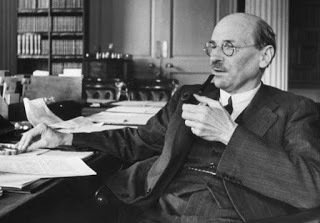 Not a poster boy, but a very effective prime ministerBefore the age of TV and mass media a glamorous image and a corporate reputation weren't so necessary in a politician. One of our most effective prime ministers was Clement Atlee, who won a huge Labour majority just after the second world war. He laid the foundations for rebuilding the shattered UK economy and established the National Health Service. Atlee was not a natural public figure - a shy, clever man who, as Deputy PM in Churchill's administration, had been the one who handled the detail behind the scenes, with a tremendous depth of knowledge. But a poster boy he certainly was not. Yet he has had a great influence for good in shaping our lives throughout the second half of the 20th century. Michael Foot, another intellectual with no public image, didn't fare as well, nicknamed 'Worzel Gummidge' in the press. He led Labour into an election they lost spectacularly and was quickly replaced. He is sometimes referred to as 'the best prime minister we never had'.
Not a poster boy, but a very effective prime ministerBefore the age of TV and mass media a glamorous image and a corporate reputation weren't so necessary in a politician. One of our most effective prime ministers was Clement Atlee, who won a huge Labour majority just after the second world war. He laid the foundations for rebuilding the shattered UK economy and established the National Health Service. Atlee was not a natural public figure - a shy, clever man who, as Deputy PM in Churchill's administration, had been the one who handled the detail behind the scenes, with a tremendous depth of knowledge. But a poster boy he certainly was not. Yet he has had a great influence for good in shaping our lives throughout the second half of the 20th century. Michael Foot, another intellectual with no public image, didn't fare as well, nicknamed 'Worzel Gummidge' in the press. He led Labour into an election they lost spectacularly and was quickly replaced. He is sometimes referred to as 'the best prime minister we never had'.
 Gordon Brown being humiliated by the Daily MailGordon Brown was vilified by the media for his lack of leadership skills and polished image. Yet his record as a Prime Minister will bear scrutiny for a long time into the future and his integrity and honesty were impeccable. The Tories have also had their PR problems. They ditched Alec Douglas Home, not because he wasn't clever enough to do the job, but because he looked like Skeletor on television.
Gordon Brown being humiliated by the Daily MailGordon Brown was vilified by the media for his lack of leadership skills and polished image. Yet his record as a Prime Minister will bear scrutiny for a long time into the future and his integrity and honesty were impeccable. The Tories have also had their PR problems. They ditched Alec Douglas Home, not because he wasn't clever enough to do the job, but because he looked like Skeletor on television.
Another question that bothers me - we're supposed to be a democracy, not an autocracy or dictatorship - rule is by cabinet committee. So why do we need a Supreme Ego to lead us? Why? I'm beginning to think that until we deal with this, we're doomed to keep on electing the politicians we deserve - leaders like Donald Trump.
 Corbyn - an honest man?It seems it's not enough to have integrity and a set of rational, humane and economically sound policies. You also have to have this elusive quality that gets you on TV and across the front pages of newspapers and has everyone trooping after you like the Pied Piper, no matter how daft or draconian your politics. Why are we so sure that the attributes of ruthlessness, cunning, speciousness, and ability to dominate others that we require of a leader are desirable qualities? I can't help but think that 'Leadership' is the last thing I'm looking for at the moment. I just want someone intelligent and capable, with some kind of vision for a better future for my kids. Someone I can trust not to blow up the planet, who might just try to make sure there's still a planet there with a tolerable environment for my grandkids to grow up in.
Corbyn - an honest man?It seems it's not enough to have integrity and a set of rational, humane and economically sound policies. You also have to have this elusive quality that gets you on TV and across the front pages of newspapers and has everyone trooping after you like the Pied Piper, no matter how daft or draconian your politics. Why are we so sure that the attributes of ruthlessness, cunning, speciousness, and ability to dominate others that we require of a leader are desirable qualities? I can't help but think that 'Leadership' is the last thing I'm looking for at the moment. I just want someone intelligent and capable, with some kind of vision for a better future for my kids. Someone I can trust not to blow up the planet, who might just try to make sure there's still a planet there with a tolerable environment for my grandkids to grow up in. A supreme leaderWhen you begin to think about it, leadership isn't exactly something to be admired. Mrs Thatcher had it in spades. Presumably Donald Trump has it, since so many people were conned into voting for him. Tony Blair had it, and he followed Leader George Bush into one of the most damaging wars of the 20th century. Hitler had it; Saddam Hussein, Muammar Gaddafi, Stalin, Lenin, Pol Pot - almost certainly Attila the Hun. So now you can see why I'm not sure it's a desirable quality. Look where it gets us.
A supreme leaderWhen you begin to think about it, leadership isn't exactly something to be admired. Mrs Thatcher had it in spades. Presumably Donald Trump has it, since so many people were conned into voting for him. Tony Blair had it, and he followed Leader George Bush into one of the most damaging wars of the 20th century. Hitler had it; Saddam Hussein, Muammar Gaddafi, Stalin, Lenin, Pol Pot - almost certainly Attila the Hun. So now you can see why I'm not sure it's a desirable quality. Look where it gets us. Not a poster boy, but a very effective prime ministerBefore the age of TV and mass media a glamorous image and a corporate reputation weren't so necessary in a politician. One of our most effective prime ministers was Clement Atlee, who won a huge Labour majority just after the second world war. He laid the foundations for rebuilding the shattered UK economy and established the National Health Service. Atlee was not a natural public figure - a shy, clever man who, as Deputy PM in Churchill's administration, had been the one who handled the detail behind the scenes, with a tremendous depth of knowledge. But a poster boy he certainly was not. Yet he has had a great influence for good in shaping our lives throughout the second half of the 20th century. Michael Foot, another intellectual with no public image, didn't fare as well, nicknamed 'Worzel Gummidge' in the press. He led Labour into an election they lost spectacularly and was quickly replaced. He is sometimes referred to as 'the best prime minister we never had'.
Not a poster boy, but a very effective prime ministerBefore the age of TV and mass media a glamorous image and a corporate reputation weren't so necessary in a politician. One of our most effective prime ministers was Clement Atlee, who won a huge Labour majority just after the second world war. He laid the foundations for rebuilding the shattered UK economy and established the National Health Service. Atlee was not a natural public figure - a shy, clever man who, as Deputy PM in Churchill's administration, had been the one who handled the detail behind the scenes, with a tremendous depth of knowledge. But a poster boy he certainly was not. Yet he has had a great influence for good in shaping our lives throughout the second half of the 20th century. Michael Foot, another intellectual with no public image, didn't fare as well, nicknamed 'Worzel Gummidge' in the press. He led Labour into an election they lost spectacularly and was quickly replaced. He is sometimes referred to as 'the best prime minister we never had'. Gordon Brown being humiliated by the Daily MailGordon Brown was vilified by the media for his lack of leadership skills and polished image. Yet his record as a Prime Minister will bear scrutiny for a long time into the future and his integrity and honesty were impeccable. The Tories have also had their PR problems. They ditched Alec Douglas Home, not because he wasn't clever enough to do the job, but because he looked like Skeletor on television.
Gordon Brown being humiliated by the Daily MailGordon Brown was vilified by the media for his lack of leadership skills and polished image. Yet his record as a Prime Minister will bear scrutiny for a long time into the future and his integrity and honesty were impeccable. The Tories have also had their PR problems. They ditched Alec Douglas Home, not because he wasn't clever enough to do the job, but because he looked like Skeletor on television.Another question that bothers me - we're supposed to be a democracy, not an autocracy or dictatorship - rule is by cabinet committee. So why do we need a Supreme Ego to lead us? Why? I'm beginning to think that until we deal with this, we're doomed to keep on electing the politicians we deserve - leaders like Donald Trump.
Published on April 23, 2017 16:33
April 18, 2017
Tuesday Poem: - Remember to be Kind
You have no idea,
absolutely no idea.
Sixteen, all imagination and deceit;
you can play anyone
except yourself.
It won’t go well; there will be times
you’ll wish yourself dead, somewhere else, anywhere
but the place you’re in.
Wanting to belong you’ll plant yourself
in foreign soil, sending your roots down deep
only to tear yourself up, bleeding, time after time, moving
your tent like a nomad across the world.
(Remember to read the instructions, the small print,
never hope for the best. )
Refuse to be seduced by roses, fast cars,
their owners, sentimental music, sunsets.
(Love, like belonging, is an uncertain partnership).
Claim your own space, never be afraid
to step out into unknown territory, armed only
with words. They will serve you well.
Love fearlessly, give everything,
and never, never regret the consequences.
Listen always for your own inner music:
it has something important to tell you.
Laugh, dance, drink wine and always
remember to be kind.
© Kathleen Jones 2017
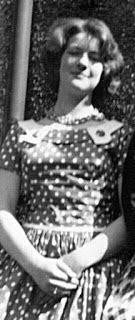
I've been dipping in and out of NaPoWriMo. I find it impossible to write a poem a day - sometimes it's a prompt I don't like, often just too busy/tired, but I'm trying to write something every day, even if it's only a few jottings. The prompt 2 days ago was to write a letter. I've also been asked to write a 'letter to my younger self' for the Royal Literary Fund website, so it's been in my thoughts for a while without me doing anything about it. So I sat on a train and did a freewrite, starting with the first words that came into my head when confronted by my sixteen year old self, 'you have no idea' - and this is the result. Still needs knocking about a bit, but I'm daring to share.
On the left is a picture of me at 16 - all romance and no sense!!
Published on April 18, 2017 03:54
April 15, 2017
Leading a Double Life and the Carpenter of Lampedusa
Writers are supposed to be good at leading double lives. 'We write to taste life twice,' wrote Anais Nin. 'In the moment and in retrospection.' But I not only have a writing life, I have an English life and an Italian life. I'm always amazed at how easily I slip into my Italian skin. There's a slowing down, a tendency to linger over sensual moments - food, wine, the sun slipping into the Mediterranean, conversations with friends, sliding your fingers through a rack of silk lingerie (ridiculously cheap) in a street market, shop window displays that are colourful works of art, a stucco building just catching the pink and amber rays of the setting sun.. . . perhaps I'd better not go on.
I'm a small part Italian, on my mother's side, so perhaps the susceptibility is in my genes. The Italians are a more sensual people than we hardened northerners. And then, Italian life is so attractive, centred as it is around the table with family and/or friends. So much of life here is sitting in the piazza with a coffee or a glass of wine (depending on how broke you are) chatting to people. Then there's the alluring workman's lunches, the 'pranzo di lavoro', with home cooking to die for and the local wine thrown in.
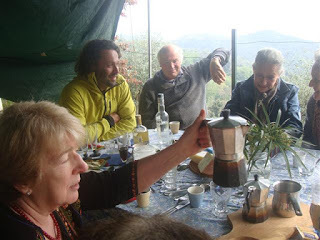 'Pranzo' with friends on our terraceBecause my partner works in a community where almost everyone is an artist or a technician, or makes their living in some way from sculptors and painters, there's always a gallery opening with free prosecco and nibbles and much hugging and kissing, and often live music as well. There are pop-up exhibitions, and impromptu affairs in people's back gardens. Life is more sociable than you can ever imagine.
'Pranzo' with friends on our terraceBecause my partner works in a community where almost everyone is an artist or a technician, or makes their living in some way from sculptors and painters, there's always a gallery opening with free prosecco and nibbles and much hugging and kissing, and often live music as well. There are pop-up exhibitions, and impromptu affairs in people's back gardens. Life is more sociable than you can ever imagine.
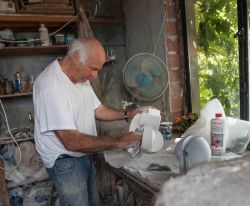 Neil at workBut under all this conviviality beats the dark heart of Italy - a precarious banking system, a political and economic system as corrupt and crony-ridden as any in the 3rd world, a massive unemployment issue among young people, taxation at 50% of everything, an increasingly unstable climate, and a refugee problem that dwarfs any other European country.
Neil at workBut under all this conviviality beats the dark heart of Italy - a precarious banking system, a political and economic system as corrupt and crony-ridden as any in the 3rd world, a massive unemployment issue among young people, taxation at 50% of everything, an increasingly unstable climate, and a refugee problem that dwarfs any other European country.
Most of them are from northern Africa. The ones who have made it this far north, make their living from selling trinkets to tourists, or parking cars in the chaotic car parks in town. Very rarely do you see anyone begging. But they do hassle you and many people give them money to go away.
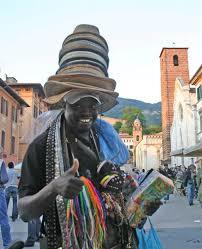 My favourite street trader, Mortela, who never hassles!Further south, in the poorer 'Mezzogiorno' (roughly translated 'afternoon') of the country, the problem is much worse. Hundreds, sometimes thousands of refugees are rescued from sinking boats every week. Hundreds more die. Anyone who has read about the
optician of Lampedusa
and his courageous actions, while out for a quiet afternoon sail, will have been moved by the decision he had to make. 'How do I save them all?' the optician asked, faced with hundreds of drowning migrants he knew could not be hauled aboard his little boat that would hold only 10. That he saved so many, at risk of sinking his own craft, is a tribute to human courage. But he is still haunted by the others he couldn't help. 'We were terribly traumatised afterwards,' he said, and his wife had to be hospitalised. Since then he has worked to help the refugees, whatever the personal cost.
My favourite street trader, Mortela, who never hassles!Further south, in the poorer 'Mezzogiorno' (roughly translated 'afternoon') of the country, the problem is much worse. Hundreds, sometimes thousands of refugees are rescued from sinking boats every week. Hundreds more die. Anyone who has read about the
optician of Lampedusa
and his courageous actions, while out for a quiet afternoon sail, will have been moved by the decision he had to make. 'How do I save them all?' the optician asked, faced with hundreds of drowning migrants he knew could not be hauled aboard his little boat that would hold only 10. That he saved so many, at risk of sinking his own craft, is a tribute to human courage. But he is still haunted by the others he couldn't help. 'We were terribly traumatised afterwards,' he said, and his wife had to be hospitalised. Since then he has worked to help the refugees, whatever the personal cost.
Italy is more charitable than many other countries - but one does wonder when that will begin to crack under the pressure of numbers in a region that is already one of the poorest in Europe.
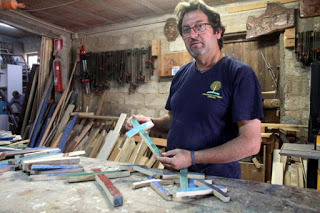
In the small museum in Pisa, among the precious medieval icons, there is a single rough cross on a pole. This was made out of two planks from wrecked boats by Francesco Tuccio , the Carpenter of Lampedusa, who has made memorials for each of those who died in the crossing. Its simplicity brings you up short among all that gilded inconography. The values of Christianity and Islam - the two religions that straddle the Mediterranean, are charitable and compassionate. They have been undermined by fear and overtaken by the brutal, uncaring values of property, wealth, and the pursuit of power through oppression and dispossession. While the Un-United Kingdom inspects its own entrails with a magnifying glass and shuts the door on a few hundred orphaned children, Italy's generous people are opening weary arms to embrace desperate people every day of the week. That's only one of the reasons why I love this country.
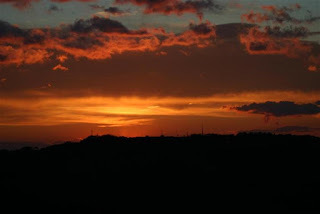 One of our spectacular sunsets over the MediterraneanHow much longer, given the UK government's chosen Brexit path, will I be able to live a double life? Probably not much longer, which is unbelievably sad. My partner is already packing up, affected by the new and horrible exchange rate, anticipating the withdrawal of health care and visa problems that are in the pipeline. He hasn't booked the flight home yet though, so there's still hope!
One of our spectacular sunsets over the MediterraneanHow much longer, given the UK government's chosen Brexit path, will I be able to live a double life? Probably not much longer, which is unbelievably sad. My partner is already packing up, affected by the new and horrible exchange rate, anticipating the withdrawal of health care and visa problems that are in the pipeline. He hasn't booked the flight home yet though, so there's still hope!
I'm a small part Italian, on my mother's side, so perhaps the susceptibility is in my genes. The Italians are a more sensual people than we hardened northerners. And then, Italian life is so attractive, centred as it is around the table with family and/or friends. So much of life here is sitting in the piazza with a coffee or a glass of wine (depending on how broke you are) chatting to people. Then there's the alluring workman's lunches, the 'pranzo di lavoro', with home cooking to die for and the local wine thrown in.
 'Pranzo' with friends on our terraceBecause my partner works in a community where almost everyone is an artist or a technician, or makes their living in some way from sculptors and painters, there's always a gallery opening with free prosecco and nibbles and much hugging and kissing, and often live music as well. There are pop-up exhibitions, and impromptu affairs in people's back gardens. Life is more sociable than you can ever imagine.
'Pranzo' with friends on our terraceBecause my partner works in a community where almost everyone is an artist or a technician, or makes their living in some way from sculptors and painters, there's always a gallery opening with free prosecco and nibbles and much hugging and kissing, and often live music as well. There are pop-up exhibitions, and impromptu affairs in people's back gardens. Life is more sociable than you can ever imagine. Neil at workBut under all this conviviality beats the dark heart of Italy - a precarious banking system, a political and economic system as corrupt and crony-ridden as any in the 3rd world, a massive unemployment issue among young people, taxation at 50% of everything, an increasingly unstable climate, and a refugee problem that dwarfs any other European country.
Neil at workBut under all this conviviality beats the dark heart of Italy - a precarious banking system, a political and economic system as corrupt and crony-ridden as any in the 3rd world, a massive unemployment issue among young people, taxation at 50% of everything, an increasingly unstable climate, and a refugee problem that dwarfs any other European country.Most of them are from northern Africa. The ones who have made it this far north, make their living from selling trinkets to tourists, or parking cars in the chaotic car parks in town. Very rarely do you see anyone begging. But they do hassle you and many people give them money to go away.
 My favourite street trader, Mortela, who never hassles!Further south, in the poorer 'Mezzogiorno' (roughly translated 'afternoon') of the country, the problem is much worse. Hundreds, sometimes thousands of refugees are rescued from sinking boats every week. Hundreds more die. Anyone who has read about the
optician of Lampedusa
and his courageous actions, while out for a quiet afternoon sail, will have been moved by the decision he had to make. 'How do I save them all?' the optician asked, faced with hundreds of drowning migrants he knew could not be hauled aboard his little boat that would hold only 10. That he saved so many, at risk of sinking his own craft, is a tribute to human courage. But he is still haunted by the others he couldn't help. 'We were terribly traumatised afterwards,' he said, and his wife had to be hospitalised. Since then he has worked to help the refugees, whatever the personal cost.
My favourite street trader, Mortela, who never hassles!Further south, in the poorer 'Mezzogiorno' (roughly translated 'afternoon') of the country, the problem is much worse. Hundreds, sometimes thousands of refugees are rescued from sinking boats every week. Hundreds more die. Anyone who has read about the
optician of Lampedusa
and his courageous actions, while out for a quiet afternoon sail, will have been moved by the decision he had to make. 'How do I save them all?' the optician asked, faced with hundreds of drowning migrants he knew could not be hauled aboard his little boat that would hold only 10. That he saved so many, at risk of sinking his own craft, is a tribute to human courage. But he is still haunted by the others he couldn't help. 'We were terribly traumatised afterwards,' he said, and his wife had to be hospitalised. Since then he has worked to help the refugees, whatever the personal cost.Italy is more charitable than many other countries - but one does wonder when that will begin to crack under the pressure of numbers in a region that is already one of the poorest in Europe.

In the small museum in Pisa, among the precious medieval icons, there is a single rough cross on a pole. This was made out of two planks from wrecked boats by Francesco Tuccio , the Carpenter of Lampedusa, who has made memorials for each of those who died in the crossing. Its simplicity brings you up short among all that gilded inconography. The values of Christianity and Islam - the two religions that straddle the Mediterranean, are charitable and compassionate. They have been undermined by fear and overtaken by the brutal, uncaring values of property, wealth, and the pursuit of power through oppression and dispossession. While the Un-United Kingdom inspects its own entrails with a magnifying glass and shuts the door on a few hundred orphaned children, Italy's generous people are opening weary arms to embrace desperate people every day of the week. That's only one of the reasons why I love this country.
 One of our spectacular sunsets over the MediterraneanHow much longer, given the UK government's chosen Brexit path, will I be able to live a double life? Probably not much longer, which is unbelievably sad. My partner is already packing up, affected by the new and horrible exchange rate, anticipating the withdrawal of health care and visa problems that are in the pipeline. He hasn't booked the flight home yet though, so there's still hope!
One of our spectacular sunsets over the MediterraneanHow much longer, given the UK government's chosen Brexit path, will I be able to live a double life? Probably not much longer, which is unbelievably sad. My partner is already packing up, affected by the new and horrible exchange rate, anticipating the withdrawal of health care and visa problems that are in the pipeline. He hasn't booked the flight home yet though, so there's still hope!
Published on April 15, 2017 13:08
April 10, 2017
Tuesday Poem: Revolution - Tatlin's Flight
Letatlin
It is machine, eviscerated, just
a grace of polished ash and canvas
the elegant equivalence of flight
I stand under its shadow
watching the cage of ribs
rotating dark and light
on a white screen; a metaphor
for all our airborne dreamings.
Long spokes - the aluminium pin feathers
of its wings - scissor across
the backdrop simulating naked aviation
the fish-shaped tail tilts up, nose down,
a structure arrested
in beautiful fall, what is left
of himself and the revolutionary music
trapped - a gigantic insect - revolving
in the moment of its execution.
© Kathleen Jones 2017
[image error] Photo Hettie Judah, Instagram.
It's NaPoWriMo - and I can't write a poem a day. Maybe a poem a week. This poem (still in progress) came out of a visit to the Revolution exhibition at the Royal Academy. Tatlin's Glider, 'Letatlin', suspended under the dome and lit so that images are projected onto the canvas backdrop as it rotates, was one of the most interesting things I saw. I could have sat for hours watching the images changing, in a silent simulation of flight.
Vladimir Tatlin was a Russian artist and architect and is usually mentioned alongside Malevich as one of the most influential artists of the revolutionary period, though the two had violent disagreements. Tatlin became a 'constructionist'. He was fascinated by the flight of birds and constructed many 'gliders' in an effort to facilitate human flight. He called them 'Letatlin' - a play on words. 'Letat' is the Russian word for flight and he combined it with his own name.
There were many other wonderful things at the exhibition - film footage by Eisenstein, a lot of paintings and sculptures by Malevich, Kandinsky, and other major painters of that period. There is some wonderful photography, and propaganda, as well as ceramics and textiles, showing the struggle that artists had to conform to the political agenda and still make a living. There are portraits of Anna Akhmatova and her lover, the artist Nikolai Punin, who was sent to the Gulags by Stalin and died there. One of the most moving parts of the exhibition was the Memory Room where you can sit and look at a screen projecting images of some of those unfortunate people Stalin sent to the camps. Civil servants, teachers, doctors, workers, writers, artists, students. Some of them survived, but many of them were shot or died of ill-treatment. It's not often that an exhibition is able to give you a glimpse of a whole culture, but this one does. It's a chilling taste of what it is like to live as a creative being under authoritarianism. Let's just pray that it never comes back.
It is machine, eviscerated, just
a grace of polished ash and canvas
the elegant equivalence of flight
I stand under its shadow
watching the cage of ribs
rotating dark and light
on a white screen; a metaphor
for all our airborne dreamings.
Long spokes - the aluminium pin feathers
of its wings - scissor across
the backdrop simulating naked aviation
the fish-shaped tail tilts up, nose down,
a structure arrested
in beautiful fall, what is left
of himself and the revolutionary music
trapped - a gigantic insect - revolving
in the moment of its execution.
© Kathleen Jones 2017
[image error] Photo Hettie Judah, Instagram.
It's NaPoWriMo - and I can't write a poem a day. Maybe a poem a week. This poem (still in progress) came out of a visit to the Revolution exhibition at the Royal Academy. Tatlin's Glider, 'Letatlin', suspended under the dome and lit so that images are projected onto the canvas backdrop as it rotates, was one of the most interesting things I saw. I could have sat for hours watching the images changing, in a silent simulation of flight.
Vladimir Tatlin was a Russian artist and architect and is usually mentioned alongside Malevich as one of the most influential artists of the revolutionary period, though the two had violent disagreements. Tatlin became a 'constructionist'. He was fascinated by the flight of birds and constructed many 'gliders' in an effort to facilitate human flight. He called them 'Letatlin' - a play on words. 'Letat' is the Russian word for flight and he combined it with his own name.
There were many other wonderful things at the exhibition - film footage by Eisenstein, a lot of paintings and sculptures by Malevich, Kandinsky, and other major painters of that period. There is some wonderful photography, and propaganda, as well as ceramics and textiles, showing the struggle that artists had to conform to the political agenda and still make a living. There are portraits of Anna Akhmatova and her lover, the artist Nikolai Punin, who was sent to the Gulags by Stalin and died there. One of the most moving parts of the exhibition was the Memory Room where you can sit and look at a screen projecting images of some of those unfortunate people Stalin sent to the camps. Civil servants, teachers, doctors, workers, writers, artists, students. Some of them survived, but many of them were shot or died of ill-treatment. It's not often that an exhibition is able to give you a glimpse of a whole culture, but this one does. It's a chilling taste of what it is like to live as a creative being under authoritarianism. Let's just pray that it never comes back.
Published on April 10, 2017 15:30



